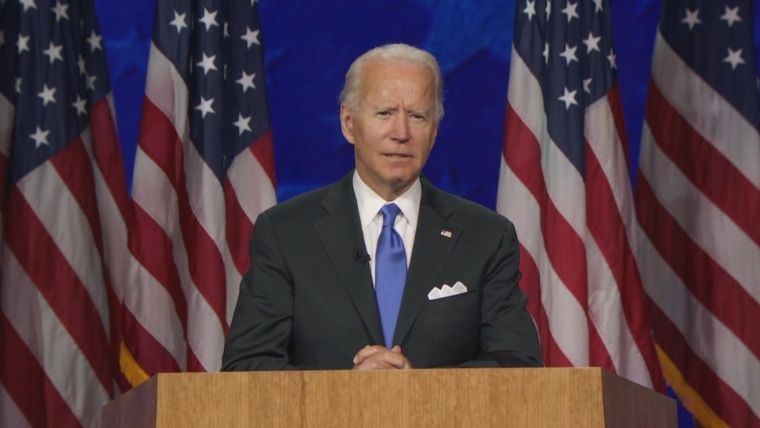WASHINGTON — Democratic presidential nominee Joe Biden stuck the landing on a four-day virtual party convention Thursday, giving an acceptance speech that rebuffed in its delivery and content President Donald Trump’s charge that he is a “sleepy” captive of the “radical left” who is “against God.”
At turns optimistic, impassioned and admonishing — and using the words of the civil rights activist Ella Baker as a bridge to an implicitly biblical frame — Biden cast himself as an “ally of the light” and Trump as a figure who has “cloaked the nation in darkness” for nearly four years.
He was much more the cagey veteran than a lion in winter.
But as much as anything, Biden’s closing remarks reflected the caution of a Democratic Party that suddenly rallied around its most well-known, even-keeled and centrist candidate after the threat of a relative newcomer or a familiar democratic socialist winning the nomination became more tangible in February and March.
That caution persists, amid the evidence of polling across the nation and in battleground states that determine the winner of the Electoral College, that Biden might be holding a modest lead with time running out on Trump’s ability to change the dynamics of the race.
It permeated the convention, which was held virtually to avoid spreading the coronavirus and was notable for the ratio of time given to Republican and independent Biden supporters compared to that of progressive leaders such as Rep. Alexandria Ocasio-Cortez, D-N.Y.
But organizers worried mostly about technical glitches fouling up the video feeds of featured speakers, not the kind of human drama and internecine conflict that characterized their last meeting four years ago.
Back then, Democrats scrambled to replace the chair of the Democratic National Committee as their convention opened after embarrassing party emails were stolen by hackers and released to the public. Top operatives for the campaigns of that year’s nominee, Hillary Clinton, and the runner-up, Bernie Sanders, banded together to try to limit floor protests by the latter’s delegates.
This time, the forced distancing caused by the pandemic granted Biden campaign officials the ability to control the flow of a convention in a way that has often been difficult for leaders of a party that is, in its nature, boisterous and democratic.
More important for Biden, Trump’s handling of the coronavirus provided an exhibit of the nonpartisan contrasts he wants to draw in trying to appeal to disaffected Republicans and independents in swing states.
“Character is on the ballot,” Biden said. “Compassion is on the ballot.”
Fundamentally, he argued that Trump has been incompetent in office — and specifically in combating the coronavirus — in part because of his deficiencies in character and compassion. In his telling, unspooled over the course of his remarks, Biden portrayed Trump as misguidedly self-interested in playing down the threat of the disease, rushing to reopen society without first containing it and stifling the voices of experts within his own administration who warned of a resurgence.
In doing so, he echoed the sentiments of several other convention speakers, including former first lady Michelle Obama, who pointedly alluded to Trump’s “it is what it is” response when he was asked about the death toll, now over 170,000, during a recent interview.
But, as the newly-minted nominee of the Democratic Party, Biden could take a public vow that none of the others could.
“Our current president has failed in his most basic duty to this nation,” Biden said. “He failed to protect us. He failed to protect America. And, my fellow Americans, that is unforgivable. As president, I will make you this promise: I will protect America. I will defend us from every attack. Seen. And unseen. Always. Without exception. Every time.”
In the perfunctory fashion of a State of the Union address, Biden nodded to some of the policies that excite elements of the Democratic base, but he largely stayed away from specific proposals. That, too, mirrored the convention’s focus on his personal traits, and those of the president, even as they related to policy choices.
Biden offered hope that the nation would find a turning point on racism in the death of George Floyd at the hands of Minneapolis police earlier this year, but he didn’t refer directly to “police” at a time when many in his party are calling for federal reforms to law enforcement and Trump is falsely accusing him of wanting to defund police forces. In reality, Biden has proposed adding hundreds of millions of dollars to the COPS program established under the 1994 anti-crime law he sponsored.
But that is a divisive topic, both for the broader voting public and within what is now Biden’s Democratic Party. And, as he said toward the close of his speech and the convention, his purpose is to bring the country together “united in our love for America and united in our love for each other.”
That spirit was demonstrated by the inclusion of many of his two dozen rivals for the nomination in individual speeches and a group video chat featured at the convention.
Biden even included a line from Washington Gov. Jay Inslee’s campaign announcement speech in his own acceptance remarks.
“Love is more powerful than hate. Hope is more powerful than fear. Light is more powerful than dark,” Biden said, leading up to Inslee’s call to action. “This is our moment. This is our mission.”













